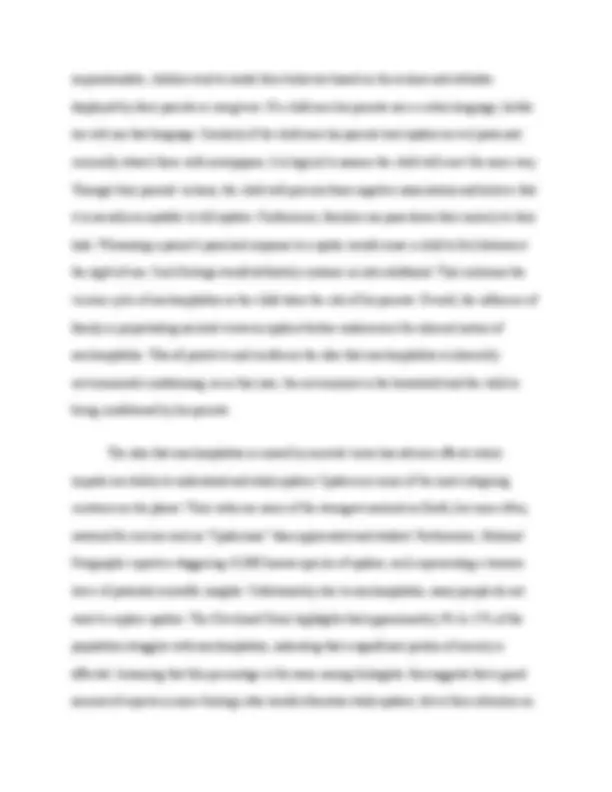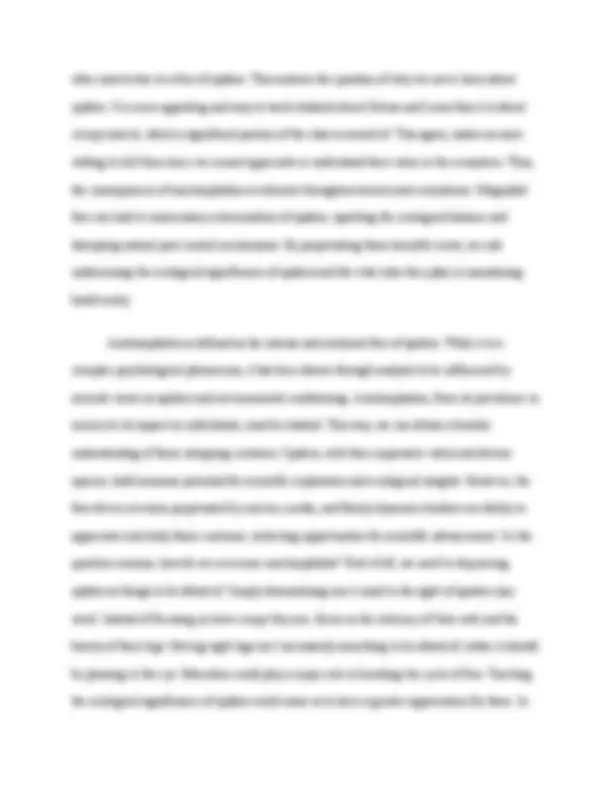





Study with the several resources on Docsity

Earn points by helping other students or get them with a premium plan


Prepare for your exams
Study with the several resources on Docsity

Earn points to download
Earn points by helping other students or get them with a premium plan
Community
Ask the community for help and clear up your study doubts
Discover the best universities in your country according to Docsity users
Free resources
Download our free guides on studying techniques, anxiety management strategies, and thesis advice from Docsity tutors
This is a five paragraph analysis essay on fear of spiders and its root cause. It is for an introductory english class and a sample for ohlone college.
Typology: Study Guides, Projects, Research
1 / 6

This page cannot be seen from the preview
Don't miss anything!




Why are We so Afraid of Spiders? Have you experienced that horrific moment when a spider suddenly scurries across the floor causing you to jump with terror? If so, you’re not alone. Arachnophobia, or the fear of spiders, is a captivating phenomenon that scientists have studied for centuries, and the question still remains; Why are we still so afraid of spiders? The formal definition of arachnophobia is derived from the Greek words "arachne" (spider) and "phobos" (fear), thus making arachnophobia the fear of spiders. According to a study conducted by the National Institute of Mental Health, arachnophobia affects around 30.5% of the global population, making it one of the most prevalent phobias. Millions of individuals all across the world experience this phobia. It can manifest in many different ways, ranging from mild discomfort to severe panic attacks. If we hope to gain deeper insight into the intricate field of human psychology and how our mind processes anxiety, it is pivotal to understand the origins of arachnophobia. Some scientists suggest genetic deposition. Essentially the idea behind this is that our ancestors felt threatened by spiders and passed down the trait to us. Our “ancestors” could refer all the way back to the early humans and even neanderthals. Others suggest that arachnophobia can be caused by our own traumatic experiences with spiders. Arachnophobia, a prevalent psychological disorder characterized by an intense and irrational fear of spiders, is a complex phenomenon but inherently caused by societal views on spiders, as environmental conditioning plays a major role in the creation of this phobia.
Movies and the media in general play a significant role in development of arachnophobia, as they perpetuate societal views that associate spiders with fear or danger. Trauma Research UK, an organization that analyzes mental disorders originating from trauma, suggests that watching films’ portrayal of spiders can lead to the formation of phobias. In movies, spiders are often depicted as creepy, evil, and dangerous beasts, instilling fear in the minds of viewers. The primary reason behind this is that it is easy to exploit the creepy-crawly nature of arachnids. Spiders such as “Shelob” from Lord of the Rings, are used as the “disgusting and scary” aspect of films to add sudden suspense to a story. Films specific to spiders include "Arachnophobia" and "Eight Legged Freaks". Such films even use negative words in conjunction with spiders in their titles. Their use of dramatic, yet fear-inducing music music, suspenseful camera angles, and startling, yet gut wrenching and spine chilling visual effects, all contribute to the psychological impact of spiders, leaving viewers anxious following viewing. Such portrayal of spiders is similar in the news, with celebrities and prominent media characters often stating a fear of spiders in interviews, often normalizing it. Overall, these examples of portrayal of spiders as lethal predators in the media fosters a sense of vulnerability and powerlessness in individuals. This exploitation of primal fears can lead to the creation of strong negative associations with spiders, conditioning the mind to react with dread and panic at the mere thought or sight of them. These images become ingrained in the subconscious, reinforcing the irrationality of arachnophobia and amplifying the fear response. Family dynamics and views on spiders also play a major role in the development of this psychological disorder. According to Mantra Care, a therapy practice specializing in phobias, children may “develop fear towards spiders if they witness family relatives exhibiting similar fears or aversions”. During early childhood, when cognitive development is highly
other insects due to a fear of spiders. This answers the question of why we never learn about spiders. It is more appealing and easy to teach students about Zebras and Lions than it is about creepy insects, which a significant portion of the class is scared of. This again, makes us more willing to kill them since we cannot appreciate or understand their value in the ecosystem. Thus, the consequences of arachnophobia reverberate throughout society and ecosystems. Misguided fear can lead to unnecessary extermination of spiders, upsetting the ecological balance and disrupting natural pest control mechanisms. By perpetuating these harmful views, we risk undermining the ecological significance of spiders and the vital roles they play in maintaining biodiversity. Arachnophobia is defined as the intense and irrational fear of spiders. While it is a complex psychological phenomena, it has been shown through analysis to be influenced by societal views on spiders and environmental conditioning. Arachnophobia, from its prevalence in society to its impact on individuals, must be studied. This way, we can obtain a broader understanding of these intriguing creatures. Spiders, with their impressive webs and diverse species, hold immense potential for scientific exploration and ecological insights. However, the fear-driven aversion perpetuated by movies, media, and family dynamics hinders our ability to appreciate and study these creatures, restricting opportunities for scientific advancement. So the question remains, how do we overcome arachnophobia? First of all, we need to stop seeing spiders as things to be afraid of. Simply desensitizing one’s mind to the sight of spiders may work. Instead of focusing on how creepy they are, focus on the intricacy of their web and the beauty of their legs. Having eight legs isn’t necessarily something to be afraid of; rather it should be pleasing to the eye. Education could play a major role in breaking the cycle of fear. Teaching the ecological significance of spiders could cause us to have a greater appreciation for them. In
the words of Ralph Waldo Emerson, "Fear defeats more people than any other one thing in the world." Let us rise above our fears, including arachnophobia, and embrace the opportunity to explore and understand the fascinating world of spiders. Works Cited “Arachnophobia.” Trauma Research UK , 5 Apr. 2022, traumaresearchuk.org/arachnophobia/.